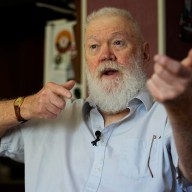Aside from the day-to-day stress of workplace disputes and deadlines, many employees in today’s economy have more long-term career worries. In “150 Best Jobs for a Secure Future,” occupational expert Laurence Shatkin provides insight from a variety of perspectives including pay, growth, openings, personality and even job-seeker age.
Topping his list is health care, an industry “that people choose not to forgo even when they might not be able to pay for other kinds of luxuries,” says Shatkin. “In turn, workers in health care can have assurance — and it continues to be an ever-expanding field.”
Runners-up on Shatkin’s list include computer systems design, educational services, government, repair and maintenance and utilities.
Why the security? It all comes down to necessity. “It’s very hard for downturns in the economy to have any effect on the overall outlook in these fields, and they tend to shed fewer workers,” the author says.
As for those industries still thrashing in the clutch of an invisible hand, Shatkin reminds us that “no two recessions are exactly the same, so while some areas are really hurt, others are untouched.” Here in the Northeast corridor, Shatkin observes the importance of research and biotechnology.
“Pharmaceuticals in Pennsylvania and New Jersey have a lot of stability and growth,” he says.
Even if you’re not looking to become a Boston-based pharmacist, being highly skilled in your chosen field will always translate into increased stability. “Work on increasing your skills in your profession of choice, because though there are a lot of job openings in low-skill industries their turnover is high,” says Shatkin. “Real opportunity is in jobs for high-skilled workers.”
The golden career rule
While his book is about secure industries, Shatkin doesn’t actually recommend that you head to med school.
“You have to give a lot of thought to what you’re good at, what makes your day and where your greatest successes have been — rather than just looking at the money or for what seems to be immediately connected to what you studied,” he says.
















